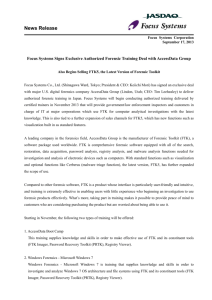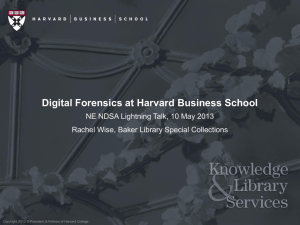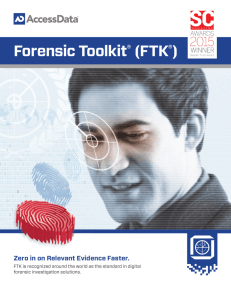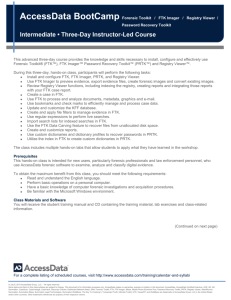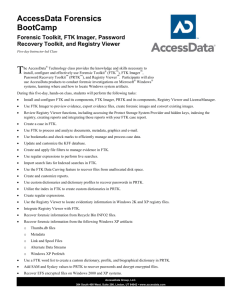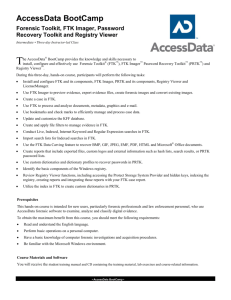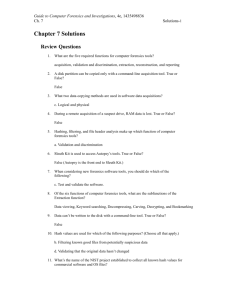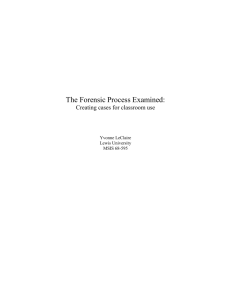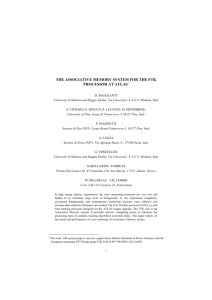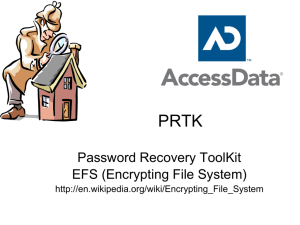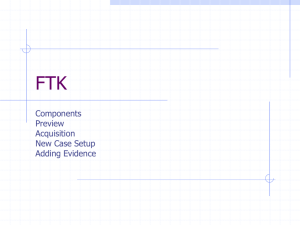Advanced FTK - Techno Security & Forensics Investigations
advertisement
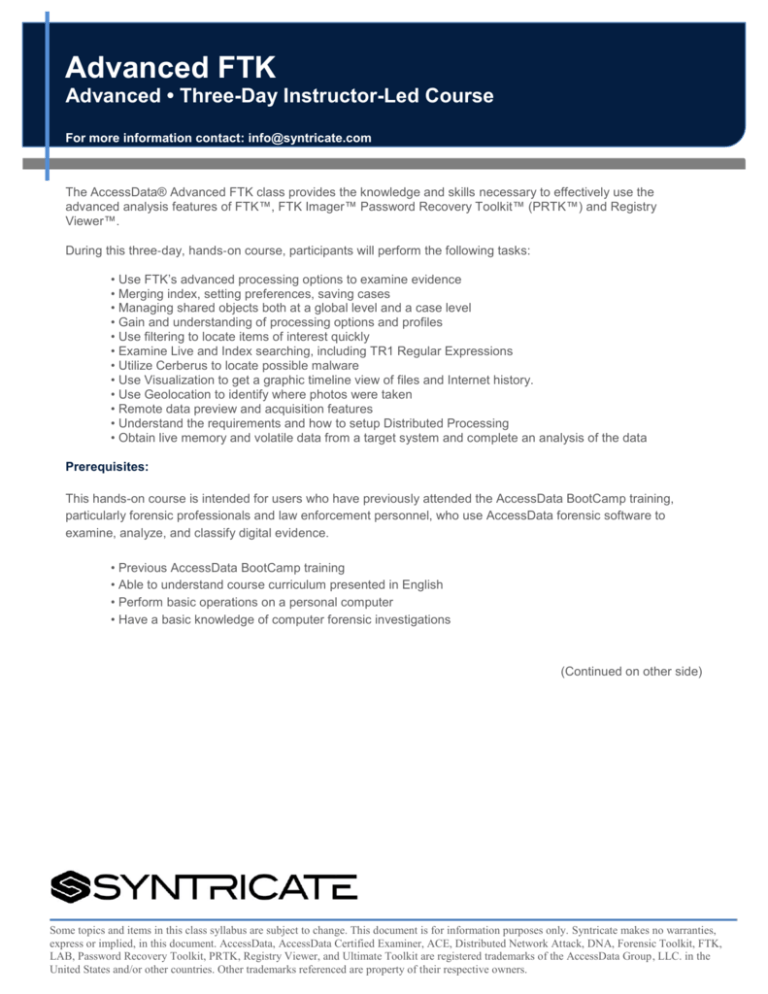
Advanced FTK Advanced • Three-Day Instructor-Led Course For more information contact: info@syntricate.com The AccessData® Advanced FTK class provides the knowledge and skills necessary to effectively use the advanced analysis features of FTK™, FTK Imager™ Password Recovery Toolkit™ (PRTK™) and Registry Viewer™. During this three‐day, hands‐on course, participants will perform the following tasks: • Use FTK’s advanced processing options to examine evidence • Merging index, setting preferences, saving cases • Managing shared objects both at a global level and a case level • Gain and understanding of processing options and profiles • Use filtering to locate items of interest quickly • Examine Live and Index searching, including TR1 Regular Expressions • Utilize Cerberus to locate possible malware • Use Visualization to get a graphic timeline view of files and Internet history. • Use Geolocation to identify where photos were taken • Remote data preview and acquisition features • Understand the requirements and how to setup Distributed Processing • Obtain live memory and volatile data from a target system and complete an analysis of the data Prerequisites: This hands-on course is intended for users who have previously attended the AccessData BootCamp training, particularly forensic professionals and law enforcement personnel, who use AccessData forensic software to examine, analyze, and classify digital evidence. • Previous AccessData BootCamp training • Able to understand course curriculum presented in English • Perform basic operations on a personal computer • Have a basic knowledge of computer forensic investigations (Continued on other side) Some topics and items in this class syllabus are subject to change. This document is for information purposes only. Syntricate makes no warranties, express or implied, in this document. AccessData, AccessData Certified Examiner, ACE, Distributed Network Attack, DNA, Forensic Toolkit, FTK, LAB, Password Recovery Toolkit, PRTK, Registry Viewer, and Ultimate Toolkit are registered trademarks of the AccessData Group, LLC. in the United States and/or other countries. Other trademarks referenced are property of their respective owners. Advanced FTK Advanced • Three-Day Instructor-Led Course For more information contact: info@syntricate.com (Continued) Module 1: Introduction Topics: • Identify the LAB components • List the LAB and PRTK system requirements • Describe how to receive upgrades and support for AccessData tools Module 5: Advanced Filtering Objectives: • Designing Filters • Compound Filters • Global Filters • Tab Filters Module 2: Case Setup Objectives: • Merging Index • Optimum Setup for FTK • Preferences • Archive/Backup • Restore • Indexing Options Module 6: Advanced Searching Techniques Objectives: • Live Search Options o Text o Pattern o Hex • Index Search o dtSearch Indexing Options o Conducting an Index Search o Importing/Exporting Search Terms o Search Operators o Searching for a phrase o Boolean Searches o Searching Options o TR1 Regular Expressions Module 3: Advanced Processing (Part 1) Objectives: • Managing Shared Objects o Carvers o Custom Identifiers o Columns o File Extension Maps o Filters o Labels • Photo DNA • Evidence Processing Profiles Module 4: Advanced Processing (Part 2) Objectives: • Managing Shared Objects • Photo DNA • Windows Event Logs • Prefetch files • Explicit Image Detection • Optical Character Recognition • Examining Video Files Module 7: Cerberus Working with Registry Viewer Objectives: • What is Cerberus Analysis • Cerberus Processing Stages • Stage 1 Analysis • Stage 1 Threat Scoring • Stage 2 Analysis • Stage 2 Report • Running Cerberus Analysis • Reviewing Results in Examiner • Exporting a Cerberus Report • Bookmarking & Reporting Cerberus Files Some topics and items in this class syllabus are subject to change. This document is for information purposes only. Syntricate makes no warranties, express or implied, in this document. AccessData, AccessData Certified Examiner, ACE, Distributed Network Attack, DNA, Forensic Toolkit, FTK, LAB, Password Recovery Toolkit, PRTK, Registry Viewer, and Ultimate Toolkit are registered trademarks of the AccessData Group, LLC. in the United States and/or other countries. Other trademarks referenced are property of their respective owners. Advanced FTK Avanced • Three-Day Instructor-Led Course For more information contact: info@syntricate.com (Continued) Module 8: Visualization Objectives: • Launching Visualization • Visualization Page • Themes • Visualization of Data o Files o Emails o Social Analysis o Traffic o Internet Browser History • Geolocation Module 12: Memory and Volatile Data Analysis Objectives: • What is memory vs. volatile data • Capturing RAM • Obtaining volatile data • Adding to case • Volatile tab • Reporting Module 9: Adding Remote Evidence Objectives: • Describe the Remote Disk Mounting Service (RDMS) • Deploy Temporary Agents • Access Remote Data with Temporary Agent • Create Digital Certificates • Deploy Enterprise Agents • Access Remote Data with Enterprise Agent o Including Memory • Mount a drive remotely • Preview and Image a drive remotely Module 10: Distributed Processing Objectives: • Describe the benefits of Distributed Processing • System Requirements • Installing DPE software Module 11: Volume Shadow Copy Objectives: • Describe how Volume Shadow Copy works • Identify what forensic information can be recovered from Volume Shadow Copy • Use FTK to process a retore point Some topics and items in this class syllabus are subject to change. This document is for information purposes only. Syntricate makes no warranties, express or implied, in this document. AccessData, AccessData Certified Examiner, ACE, Distributed Network Attack, DNA, Forensic Toolkit, FTK, LAB, Password Recovery Toolkit, PRTK, Registry Viewer, and Ultimate Toolkit are registered trademarks of the AccessData Group, LLC. in the United States and/or other countries. Other trademarks referenced are property of their respective owners. AccessData Advanced Forensics Intermediate • Five-Day Instructor-Led Course For more information contact: info@syntricate.com (Continued) Module 8: Narrowing Your Focus Objectives: • Narrow evidence items using the Known File Filter, checked items, and filtered/ignored items • Perform an indexed search • Import search terms from text files • Perform a regular expression search Lab: During the practical, participants learn how to effectively sort through case evidence to locate items of interest. Students will use the KFF database to ignore or flag known files, perform keyword searches, use dtSearch options to customize a search, and use regular expressions to search case evidence for pattern data such as credit card numbers or IP addresses. Module 9: Regular Expressions Objectives: • Understand basic Operators and Literals in RegEx • Learn 10 very useful characters and concepts of RegEx++, enabling you to write hundreds of expressions • Create and interpret a basic regular expression that includes Function Groups and Repeat Values • Integrate a new RegEx into FTK for use • Integrate a new TR1 Expression into FTK for use Lab: • Create a regular expression and add it to the list of expressions in the FTK Live Search tab • Perform a live search using the regular expression you created Module 10: Filtering the Case Objectives: • Explain basic concepts of rule-based filtering in FTK • Design a basic filter and use it to filter data • Manage shared filters • Discuss the use of compound filters • Explain the difference between global and tab filters • Import and export filters Lab: During the labs, participants create filters to locate specific items of interest. Students will further refine filter results using compound filters. Finally, students will have a change to import and export filters so they can share filters with co-workers and colleagues. Module 11: The Recycle Bin Objectives: • Describe the function of the Windows Recycle Bin • Identify the differences in the Recycle Bin on FAT and NTFS systems • List what information can be recovered from the INFO2 file • Describe how FTK parses and displays INFO2 files • Describe what happens when a file is deleted or removed from the Recycle Bin • Explain what happens when a user empties the Recycle Bin • Identify how information can still be retrieved when items are removed from the Recycle Bin • Describe the forensic implications of files located in the Recycle Bin • Describe the function of the Orphan folder • Create a regular expression to recover unallocated INFO2 file records Lab: • Retrieve deleted evidence from the Recycle Bin • Use a regular expression to locate INFO2 files • Retrieve the following information from INFO2 files o Deleted File Path o Deleted File Index o Deleted File Drive Number o Deleted File Date and Time Some topics and items in this class syllabus are subject to change. This document is for information purposes only. Syntricate makes no warranties, express or implied, in this document. AccessData, AccessData Certified Examiner, ACE, Distributed Network Attack, DNA, Forensic Toolkit, FTK, LAB, Password Recovery Toolkit, PRTK, Registry Viewer, and Ultimate Toolkit are registered trademarks of the AccessData Group, LLC. in the United States and/or other countries. Other trademarks referenced are property of their respective owners. AccessData Advanced Forensics Intermediate • Five-Day Instructor-Led Course For more information contact: info@syntricate.com (Continued) Module 12: Common Windows XP Artifacts Thumbs.db Files Objectives: • Define the Thumbs.db file • Define Thumbs.db behavior • Identify thumbnail graphics • Define EFS file changes and Thumbs.db behavior Lab: • Use FTK to recover graphics information from Thumbs.db files Link and Spool Files Objectives: • Define the function of a link file • Identify what evidentiary information is contained in link files • Describe how FTK parses and displays link files • Define the function of a spool file and its related files • Identify what evidentiary information is contained in spool files Lab: • Use FTK to recover forensic information from link files, including the MAC address of the target machine • Use link file data to associate a file with a USB drive • Use FTK to recover forensic information from spool files Alternate Data Streams Objectives: • Identify the differences between named and alternate data streams • Identify forensic issues associated with alternate data streams • Identify how Forensic Toolkit (FTK) displays alternate data streams • Describe how alternate data streams impact file size, disk space, and file creation date Lab: • Identify alternate data stream files in your case Windows Prefetch Objectives: • Accurately define Prefetch, Superfetch, and their related functions • Definte the forensic importance of Prefetch Registry entries, Prefetch files, and the Layout.ini file • View and analyze pertinent Prefetch artifacts as they relate to case analysis and user behavior Lab: • View Prefetch settings in the Registry • View Prefetch entries in FTK to find the last date and time an application was launched • View Prefetch entries in FTK to determine the number of times an application was launched Some topics and items in this class syllabus are subject to change. This document is for information purposes only. Syntricate makes no warranties, express or implied, in this document. AccessData, AccessData Certified Examiner, ACE, Distributed Network Attack, DNA, Forensic Toolkit, FTK, LAB, Password Recovery Toolkit, PRTK, Registry Viewer, and Ultimate Toolkit are registered trademarks of the AccessData Group, LLC. in the United States and/or other countries. Other trademarks referenced are property of their respective owners. AccessData Advanced Forensics Intermediate • Five-Day Instructor-Led Course For more information contact: info@syntricate.com (Continued) Module 13: Working with PRTK Objectives: • Navigate within the PRTK interface • Identify the available password recovery modules and their associated attack types • Import user-defined dictionaries and FTK word lists to use in a password recovery attack • Create biographical dictionaries • Set up profiles • Explain what a PRTK profile is and how it is used • Recount the AccessData Methodology • Recover Windows logon passwords Lab: • Export encrypted files from a case • Export a word list and create a custom dictionary • Create a Biographical dictionary • Create a profile • Recover a password • Locate SAM and SysKey Files • Attack and decrypt encrypted files, then list the recovered passwords Module 14: Encrypting File System Objectives: • Describe how EFS works • List the information required to recover EFS encrypted files on Windows 2000 systems • List the information required to recover EFS ecrypted files on Windows XP Professiona Service Pack 1 (SP1) and later systems • List potential problems associated with recovering EFS encrypted data Lab: • Create EFS encrypted files • Recover EFS encrypted files in FTK Module 15: Case Reporting Objectives: • Define a report o Modify the case information o Include a list of bookmarked files o Export bookmarked files with the report o Include thumbnails of bookmarked graphics o Manage the appearance of the Bookmark section o Include thumbnails of case graphics o Link thumbnails to full-sized graphics in the report directory o Export and link video files o Export rendered videos and thumbnails o Include a list of directories, subdirectories, files, and file types o Include a list of case files and file properties in the report o Export case files associated with specific file categories o Append a registry report to the case report • Generate reports in the following formats: o PDF o HTML o RTF o WML o XML o DOCX o ODT • Generate reports in other languages Lab: During the practical, participants create multiple reports from a single case to explore all options available from the report wizard. They build from a very basic report to a detailed report that contains customized report items. Practical Skills Assessment The AccessData Advanced Forensics class includes a Practical Skills Assessment (PSA). This performance-based assessment requires participants to apply key concepts presented during the class to complete a practical exercise. Participants who successfully complete the exercise receive a PSA certificate of completion. Some topics and items in this class syllabus are subject to change. This document is for information purposes only. Syntricate makes no warranties, express or implied, in this document. AccessData, AccessData Certified Examiner, ACE, Distributed Network Attack, DNA, Forensic Toolkit, FTK, LAB, Password Recovery Toolkit, PRTK, Registry Viewer, and Ultimate Toolkit are registered trademarks of the AccessData Group, LLC. in the United States and/or other countries. Other trademarks referenced are property of their respective owners.
